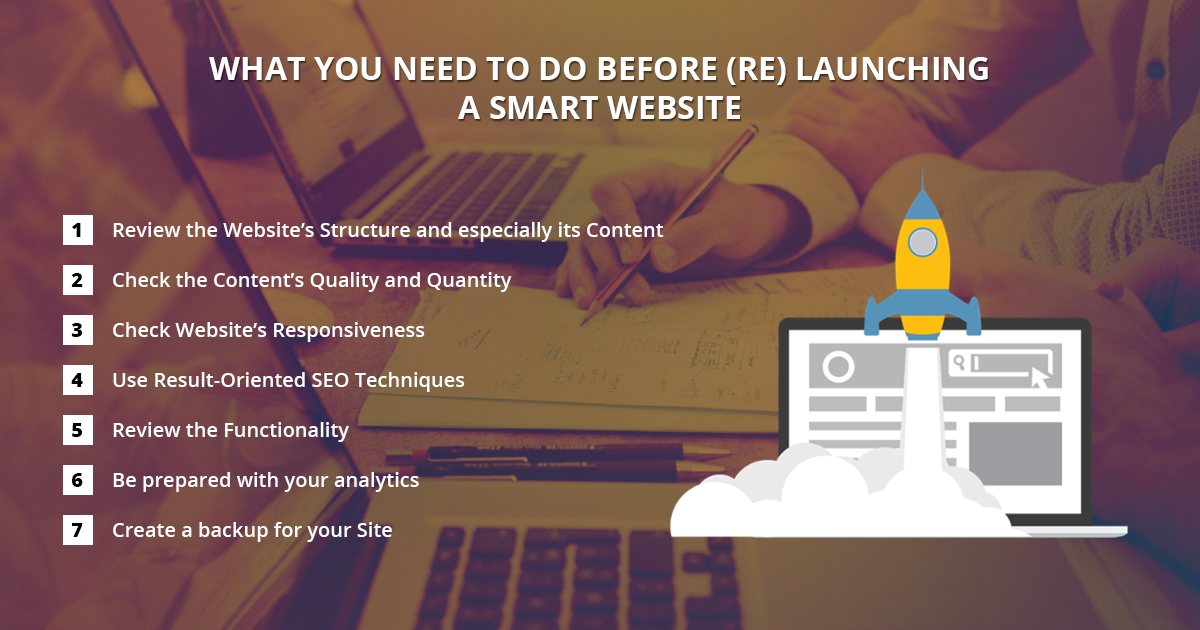What You Need to do Before (RE) Launching a Smart Website
Just the way a website is important for a business in this current digital era, equally important is to create a launch plan before (re)launching your website. No matter how much you are expertise in, launching a website is always a complicated task. Small mistakes can lead to big losses. In order to avoid such losses, below is a checklist depicting seven practices to be followed before launching a website:
1. Review the Website's Structure and especially its Content
The structure of website and its content affects the ranking of the website to a great extent. Each page of the site should be targeted such that it contains an adequate amount of major and minor keywords. Along with this, keyword stuffing should be avoided. For this purpose, it is very necessary to review the website to ensure that everything sounds good and is working properly.
This would include "proofreading" of all content of your pages and then proofreading again to make sure that all the images and videos are responding properly. Review would also include the calculation of keyword density because "keyword density" plays a great role.
2. Check the Content's Quality and Quantity.
It has been observed since years that content plays a vital role in on-page optimization. The content should be such that it has got the ability to engage and also help its visitors. Data shows that WebPages with a decent high number of words and with more details has got more probability to rank high than pages with low count of words.
3. Check Website's Responsiveness
Now, it is immensely important for a website to be completely responsive and to fit into all kinds of web browsers and various kinds of devices. To do this, check the website's appearance on different types of devices like, desktops, laptops, tablets and mobile devices. Ensure that the websites looks the way you want on all these devices. This is also very important for the ranking of your website.
4. Use Result-Oriented SEO Techniques
If you actually want to get a good ratio of visitors, proven SEO techniques should be used. This includes, use of a good title tag along with unique Meta descriptions, containing the main keywords. Each page should target on a specific keyword to help visitor find a solution to his/her problem and to let crawler know that your website is relevant.
5. Review the Functionality
Before launching a website, make sure that the navigation and other features are working properly. Why this is important? It is because having any function on the site, not working properly, can prove to be a great way to take away the visitor from your website. Along with this, ensure that none of the internal and the external links present on the site is empty and all are working properly with proper load times.
6. Be Prepared With Your Analytics
If you are building a website and working so lot on it, you would definitely need to know its performance after its launch. These analytics will help you to analyze and evaluate your website so that you can come to know if it is not working properly and improve on the reasons behind it. For this, you can make use of free "Google Analytics Tool" which will help you to monitor how visitors navigate through your website, how much time they spend on it and finally how they perceive your website.
7. Create a Backup for Your Site
The last step just before launching a website would be to create a backup of your website so that you do not need to suffer from any kind of data loss in any circumstances. For this purpose, site backup should be done on regular intervals of time. This may protect you from any situation like a malware affecting your website and creating multiple copies of it. This will thus provide you an additional peace of mind in terms of "Security".

